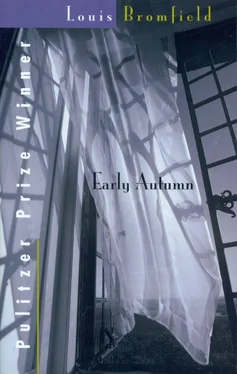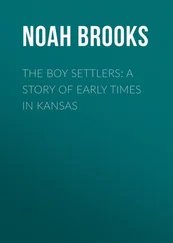She experienced, too, an odd and satisfying feeling of reality, of truth, as if in some way the air all about her had become cleared and freshened. Death was not a thing one could deny by pretense. Death was real. It marked the end of something, definitely and clearly for all time. There could be no deceptions about death.
She wished now that she had told Nannie not to speak to the others. She wanted to stay there alone in the dimly lighted room until the sky turned gray beyond the marshes.
They did not leave her in peace with her son. There came first of all a knock which admitted old Nannie, still trembling and hysterical, followed by the starched and efficient Miss Egan, who bustled about with a hard, professional manner, and then the rattling, noisy sounds of Doctor Jenkins’ Ford as he arrived from the village, and the far-off hoot of a strange motorcar horn and a brilliant glare of light as a big motorcar rounded the corner of the lane at the foot of the drive and swept away toward Brook Cottage. The hall seemed suddenly alive with people, whispering and murmuring together, and there was a sound of hysterical sobbing from some frightened servant. Death, which ought to occur in the quiet beauty of solitude, was being robbed of all its dignity. They would behave like this for days. She knew that it was only now, in the midst of all that pitiful hubbub, that she had lost her son. He had been hers still, after a fashion, while she was alone there in the room.
Abruptly, in the midst of the flurry, she remembered that there were others besides herself. There was Sybil, who had come in and stood beside her, grave and sympathetic, pressing her mother’s hand in silence; and Anson, who stood helplessly in the corner, more awkward and useless and timid than ever in the face of death. But most of all, there was John Pentland. He was not in the room. He was nowhere to be seen.
She went to search for him, because she knew that he would never come there to face all the others; instead, he would hide himself away like a wounded animal. She knew that there was only one person whom he could bear to see. Together they had fought for the life of the boy and together they must face the cold, hard fact of his death.
She found him standing on the terrace, outside the tall windows that opened into the drawing room, and as she approached, she saw that he was so lost in his sorrow that he did not even notice her. He was like a man in a state of enchantment. He simply stood there, tall and stiff and austere, staring across the marshes in the direction of the sea, alone as he had always been, surrounded by the tragic armor of loneliness that none of them, not even herself, had ever succeeded in piercing. She saw then that there was a grief more terrible than her own. She had lost her son but for John Pentland it was the end of everything. She saw that the whole world had collapsed about him. It was as if he, too, had died.
She did not speak to him at first, but simply stood beside him, taking his huge, bony hand in hers, aware that he did not look at her, but kept staring on and on across the marshes in the direction of the sea. And at last she said softly, “It has happened, at last.”
Still he did not look at her, but he did answer, saying, “I knew,” in a whisper that was barely audible. There were tears on his leathery old cheeks. He had come out into the darkness of the scented garden to weep. It was the only time that she had ever seen tears in the burning black eyes.
Not until long after midnight did all the subdued and vulgar hubbub that surrounds death fade away once more into silence, leaving Olivia alone in the room with Sybil. They did not speak to each other, for they knew well enough the poverty of words, and there was between them no need for speech.
At last Olivia said, “You had best get some sleep, darling; tomorrow will be a troublesome day.”
And then, like a little girl, Sybil came over and seating herself on her mother’s lap put her arms about her neck and kissed her.
The girl said softly, “You are wonderful, Mother. I know that I’ll never be so wonderful a woman. We should have spared you tonight, all of us, and instead of that, it was you who managed everything.” Olivia only kissed her and even smiled a little at Sybil. “I think he’s happier. He’ll never be tired again as he used to be.”
She had risen to leave when both of them heard, far away, somewhere in the distance, the sound of music. It came to them vaguely and in snatches borne in by the breeze from the sea, music that was filled with a wild, barbaric beat, that rose and fell with a passionate sense of life. It seemed to Olivia that there was in the sound of it some dark power which, penetrating the stillness of the old house, shattered the awesome silence that had settled down at last with the approach of death. It was as if life were celebrating its victory over death, in a savage, wild, exultant triumph.
It was music, too, that sounded strange and passionate in the thin, clear air of the New England night, such music as none of them had ever heard there before; and slowly, as it rose to a wild crescendo of sound, Olivia recognized it—the glowing barbaric music of the tribal dances in Prince Igor, being played brilliantly with a sense of abandoned joy.
At the same moment Sybil looked at her mother and said, “It’s Jean de Cyon. … I’d forgotten that he was arriving tonight.” And then sadly, “Of course he doesn’t know.”
There was a sudden light in the girl’s eye, the merest flicker, dying out again quickly, which had a strange, intimate relation to the passionate music. Again it was life triumphing in death. Long afterward Olivia remembered it well … the light of something which went on and on.
1
The news reached Aunt Cassie only the next morning at ten and it brought her, full of reproaches and tears, over the dusty lanes to Pentlands. She was hurt, she said, because they had not let her know at once. “I should have risen from my bed and come over immediately,” she repeated. “I was sleeping very badly, in any case. I could have managed everything. You should have sent for Aunt Cassie at once.”
And Olivia could not tell her that they had kept her in ignorance for that very reason—because they knew she would rise from her bed and come over at once.
Aunt Cassie it was who took the burden of the grief upon her narrow shoulders. She wept in the manner of a professional mourner. She drew the shades in the drawing room, because in her mind death was not respectable unless the rooms were darkened, and sat there in a corner receiving callers, as if she were the one most bereft, as if indeed she were the only one who suffered at all. She returned to her own cupolaed dwelling only late at night and took all her meals at Pentlands, to the annoyance of her brother, who on the second day in the midst of lunch turned to her abruptly and said: “Cassie, if you can’t stop this eternal blubbering, I wish you’d eat at home. It doesn’t help anything.”
At which she had risen from the table, in a sudden climax of grief and persecution, to flee, sobbing and hurt, from the room. But she was not insulted sufficiently to take her meals at home. She stayed on at Pentlands because, she said, “They needed someone like me to help out. …” And to the trembling, inefficient Miss Peavey, who came and went like a frightened rabbit on errands for her, she confided her astonishment that her brother and Olivia should treat death with such indifference. They did not weep; they showed no signs of grief. She was certain that they lacked sensibility. They did not feel the tragedy. And, weeping again, she would launch into memories of the days when the boy had come as a little fellow to sit, pale and listless, on the floor of her big, empty drawing room, turning the pages of the Doré Bible.
Читать дальше












